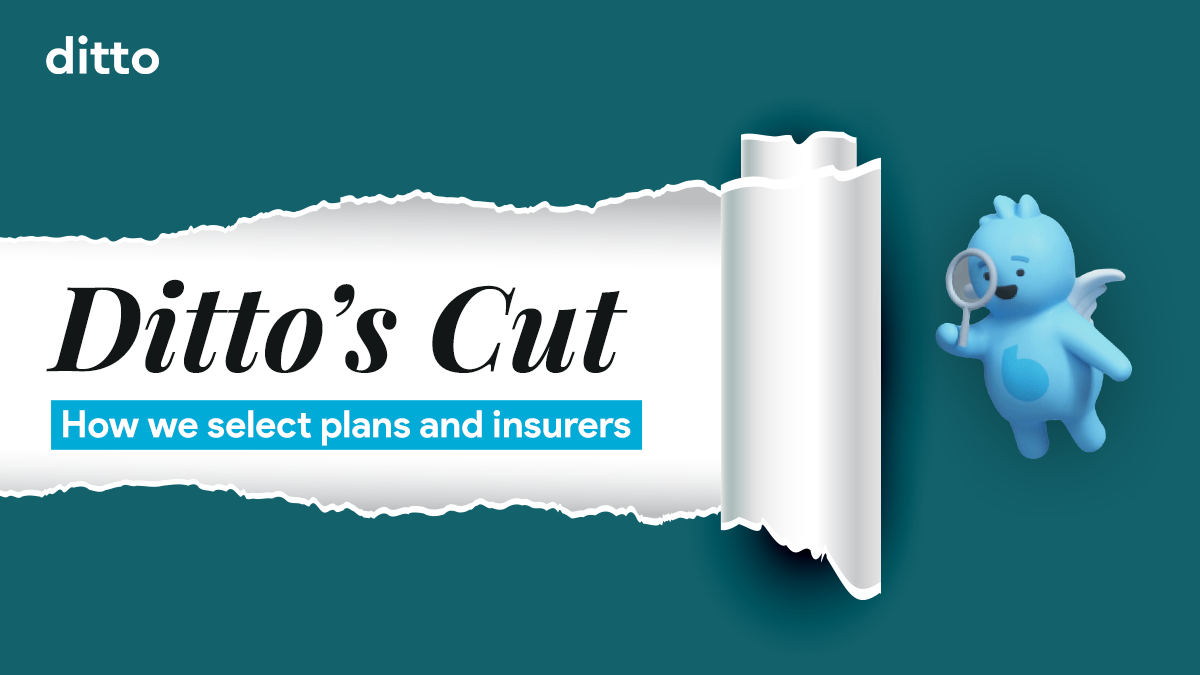Insurance is complicated, and “top lists” on the internet often feel arbitrary or biased. We know, because we’ve been accused of the same. That’s why we’re changing our approach. Instead of calling something the best or top, we feature only those plans and insurers that clear our benchmark.
Every plan or insurer you see here has gone through a transparent, rigorous review grounded in IRDAI regulations, three years of claims data, and Ditto’s own operational experience with customers at claim time.
We also want you to know exactly where our affiliations lie. Ditto is a licensed corporate agent, which means we partner with certain insurers. But these partnerships are never random. Each partner must first meet high bars for scale, claims track record, product quality, and customer service. At the same time, we also evaluate non-partner insurers so you see the full picture, not just what we sell.
It’s natural to second-guess these lists, and you should. If our rankings don’t match your judgment, that’s okay, trust your instincts. Treat this as a strong starting shortlist and weigh it against your needs.
Ditto’s Cut is our evidence-backed view of what serves customers best and we’ll refine it as the data changes.
Ditto’s six-point evaluation framework - For policies
Every plan that makes it into Ditto’s lists is scored against six pillars. These are the same whether it’s a health policy or a term policy, though the exact checks differ by category.
1) Product quality (base product features)
The insurance contract is the core of the policy. We look at what’s actually covered, how exclusions are worded, and whether there are hidden restrictions.
- Health: room-rent rules, waiting periods, sub-limits, co-pays, restoration and bonus.
- Term: riders (like critical illness or waiver of premium), flexibility features (life stage benefits, zero-cost exits), and how clearly underwriting rules are disclosed.
2) Claims experience & service
A policy is only as good as its claim support. We use three-year averages from IRDAI reports and, for partners, Ditto’s own claim data i.e. things like pre-auth turnaround times, settlement delays, and how often escalations succeed. For non-partners, we rely on regulator reports and verified public feedback.
3) Network & accessibility / underwriting transparency
- Health: how strong the hospital network is in real cities, and whether cashless arrangements actually work.
- Term: whether underwriting rules are transparent, medical tests are fair, and policies are issued without unnecessary delays or declines.
4) Flexibility
We check if the plan offers meaningful ways to adapt—whether it’s restore and booster benefits in health, or riders, premium break option and special exits in term. A good plan should bend to your needs, not the other way around.
5) Affordability compared to peers
We don’t chase the cheapest price, but we do compare like-for-like profiles to see if a plan is fairly priced relative to its features. If you’re paying more, you should be getting more.
6) Operational reliability
The small things that matter every day: are helplines responsive, do endorsements and corrections get processed quickly, and does the insurer proactively update customers when rules change? These don’t show up in brochures, but they decide how smooth your experience really is.
Ditto’s three-point evaluation framework for insurers
When we evaluate an insurer (separate from its individual plans), we look at three core pillars:
1) Financial Strength & Stability
We check if the insurer is financially sound, if there are consistent disclosures, and no persistent regulatory red flags. An insurer has to be able to honour claims not just today, but decades from now.
2) Claims & Customer Track Record
We use three years of IRDAI data (settlement ratios, repudiations, complaints volumes) along with escalation trends. For our partners, we also factor in Ditto’s own claim-time experience — how quickly pre-authorizations are approved, how settlements flow, and how well complaints are resolved.
3) Operational Reliability & Service
Beyond numbers, we assess how the insurer actually behaves with customers: are helplines reachable, do endorsements and corrections happen smoothly, and do they proactively roll out regulator-mandated updates. Reliable service is what turns a decent contract into a stress-free policy.
Our treatment of partner insurers
Ditto is a licensed corporate agent. That means when you buy a policy through us, we earn a commission from the insurer. But partnerships are not random. They are formed only with insurers that already meet our high benchmarks for claims track record, product quality, and operational reliability.
Technically, IRDAI regulations allow a corporate agent to tie up with up to nine insurers in each category (life, general, and health). We deliberately work with fewer, because not every insurer clears our benchmark. Partnerships are a filter on quality, not a shortcut around it.
Just as non-partners can improve and join our partner list one day, current partners are not guaranteed to stay forever. If an insurer’s claims performance drops, solvency weakens, or service reliability slips below our bar, we may pause featuring their products or even drop them from our partner list.
With our partners, we also have the advantage of richer operational data. Beyond IRDAI’s reports, we track real claim-time experience — pre-authorization timelines, cashless approval rates, settlement delays, and escalation handling. This lets us evaluate partners at a deeper operational level.
Commissions don’t influence our rankings. Our evaluations are done without looking at payout tables, and honestly, it wouldn’t matter if we did. Across insurers, commissions are usually set in the same narrow range under IRDAI rules. So whether it’s HDFC or Care or Star, the difference is tiny. There’s no real incentive for us to push one plan over another.
As of today, Ditto is formally tied up with the following insurers:
Health insurance partners
- HDFC Ergo
- Care Health Insurance
- Niva Bupa
- Star Health
- Aditya Birla Health
- ICICI Lombard
Term insurance partners
- ICICI Prudential
- HDFC Life
- Axis Max Life
- Bajaj Allianz Life
- Tata AIA Life
Partnership, however, is not a guarantee of recommendation. Even though we are partnered with certain insurers, we may no longer recommend some of their plans because they have slipped below our benchmark in areas like claims experience or operational reliability.
Our treatment of non-partner insurers
We often review and feature plans from insurers we don’t have a partnership with. Why? Because a complete picture demands it. If a non-partner plan is strong for a particular profile, we’ll still showcase it, even though we don’t earn from it.
There’s another reason too: partnerships aren’t fixed forever. Some insurers may not meet our benchmark today, but if they strengthen their claims performance, product quality, or service reliability in the future, they could become Ditto partners. By tracking and occasionally featuring non-partners, we keep an eye on the market and give our readers visibility into insurers who might rise to that standard.
So while most of our focus is on partner insurers (where we have the deepest claim-time data), we’ll never hide a good non-partner option.
For non-partner insurers, our evaluation rests on publicly available evidence:
- IRDAI annual reports & Statistics Handbook – three-year averages for claim settlement, repudiation, and grievances.
- Product brochures, policy wordings and Customer Information Sheets (CIS) – to check coverage, riders, exclusions, and flexibility.
- Public customer feedback – used carefully and capped in influence to avoid bias.
The difference is simply in data depth. With partner insurers, we also draw on Ditto’s own claim-time experience (e.g., pre-auth approvals, cashless success rates, and settlement timelines). With non-partners, we rely on regulatory disclosures and verified reviews.
Our promise: we never suppress a strong non-partner plan. If it meets our benchmark and deserves to be on the shortlist, we say so.
Governance & Updates
We don’t publish a list and leave it frozen. Insurance products evolve, and so do our rankings.
- Update cadence: Every 90 days, we review every list and every number we’ve published to ensure it reflects the most recent IRDAI data, product wordings, and operational experience.
- Material changes: If something important shifts — for example, an insurer’s solvency ratio drops, a plan adds/loses key features, or claim support deteriorates — we will update the article immediately.
- Transparency: When we make a material change, we’ll reflect it directly on the page, with a short note explaining what changed and why.
Corrections & Feedback
At Ditto, we strive for accuracy and transparency in every article, guide, and comparison we publish. All content is authored and reviewed by licensed insurance professionals linked to Ditto.
That said, if you believe we’ve made an editorial error, whether it’s a factual inaccuracy, a missing update, or unclear phrasing, we want to hear from you.
You can write to us at: [Editorial Team]. Please include:
- A link to the page in question
- The section or sentence you believe needs correction
- Any supporting evidence or references
Our editorial team will review the request, make corrections if required, and note the update on the page if it’s material.
Last updated on:










